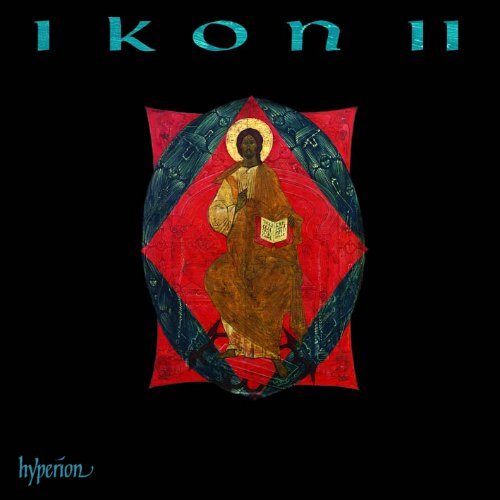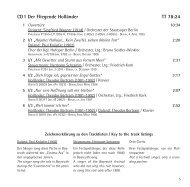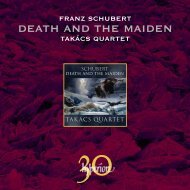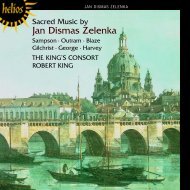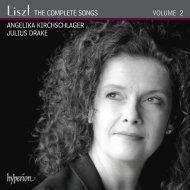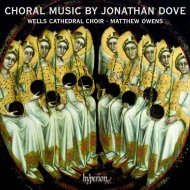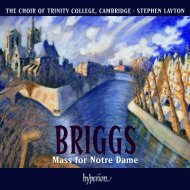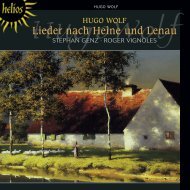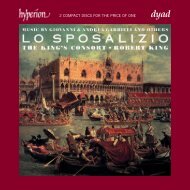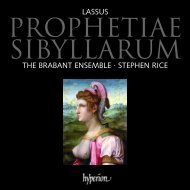Velichit Dusha Moya Gospoda - Abeille Musique
Velichit Dusha Moya Gospoda - Abeille Musique
Velichit Dusha Moya Gospoda - Abeille Musique
You also want an ePaper? Increase the reach of your titles
YUMPU automatically turns print PDFs into web optimized ePapers that Google loves.
T HIS<br />
RECORDING centres on music produced by a<br />
group of composers linked to the Moscow Synodal<br />
School of Church Singing, famous for its choir<br />
(comprising men and boys) at the beginning of the<br />
twentieth century. These composers made, up to the<br />
time of the momentous events of 1917, a significant<br />
contribution to the future of Russian choral music, one<br />
that, while never forgotten in Russia, is now also coming to<br />
be appreciated in the West. That their work did not emerge<br />
from a vacuum is made evident here by the inclusion of<br />
music by earlier composers: Pyotr Tchaikovsky (1840–<br />
1893), Nikolai Rimsky-Korsakov (1844–1908), Mili<br />
Balakirev (1837–1910) and César Cui (1835–1918).<br />
In 1879 there occurred a famous incident which would<br />
have significant consequences for Russian church music.<br />
Pyotr Jürgenson, the Moscow music publisher who<br />
frequently worked with the Imperial Chapel, published<br />
Tchaikovsky’s Liturgy of St John Chrysostom without the<br />
authorization of the Chapel—indispensable since the<br />
time of Bortnyans’ky. Bakhmetev, its director, attempted to<br />
forbid publication, but Tchaikovksy sought and received<br />
authorization from the Senate. Though many have<br />
considered the work too ‘Western’, it may be seen as truly<br />
Russian in spirit, and marks the end of the period of<br />
German domination and the initiation of the study and<br />
recovery of the Russian Church’s musical past. Tchaikovsky<br />
himself later worked more seriously with the chant<br />
repertoire, and his settings for the Vigil show a preoccupation<br />
with finding a valid style of genuinely liturgical<br />
composition. The present recording includes his arresting<br />
setting of Priidite, poklonimsya, followed by the Trisagion<br />
(Trisviatoye) 8, from his 1879 Liturgy.<br />
Rimsky-Korsakov was similarly concerned, in many of<br />
his remarkable but now rarely performed sacred works,<br />
with the heritage of monophonic chant. His simple setting<br />
of the Lord’s Prayer bo is the exception that proves the<br />
2<br />
rule: it is known throughout the Orthodox world and<br />
beyond, in its original Slavonic and in many other languages.<br />
The names of Balakirev and Cui are less frequently<br />
associated with the composition of sacred music.<br />
Balakirev, who, like Rimsky-Korsakov, was appointed to the<br />
Imperial Court Chapel—he was its administrator from<br />
1883 to 1884—left a mere nine church compositions,<br />
though he also wrote Penie pri Arkhiereiskom (Chants for<br />
the Archbishop’s Service) which are lost. Da molchit<br />
vsyakaya plot bs is the hymn sung at the Great Entrance<br />
(when the celebrant transfers the bread and wine, in<br />
procession, from the table of preparation to the altar table)<br />
on Holy Saturday. Balakirev’s setting, published in 1900,<br />
is built on a Kievan chant, which may be heard in the<br />
soprano voice. Cui’s interest in sacred music occurred<br />
only towards the end of his life. Pesn’ Presvyatïya<br />
Bogoroditsï (<strong>Velichit</strong> dusha moya <strong>Gospoda</strong>) cn is a setting<br />
of the Magnificat, which is sung at Matins in the Byzantine<br />
rite, and includes the refrain ‘More honourable than the<br />
Cherubim and more glorious beyond compare than<br />
the Seraphim, […] true Theotokos, we magnify thee’, for<br />
which Cui employs a unifying melodic tag. It is a dramatic<br />
setting, with nothing specifically Russian in its character<br />
(except for the employment of low bass writing), and has<br />
more of the concert hall than the church about it, but it is<br />
a remarkable conception, with moments of outstanding<br />
beauty. The last few minutes of the work are as magnificent<br />
as they are unexpected.<br />
The return to Russia’s liturgical and musical heritage<br />
had been begun by Prince Vladimir Fyodorovich Odoyevsky<br />
(1804–1869), a philosopher, writer, critic and musicologist.<br />
He was a founder member of the Russian Musical<br />
Society, which played an extremely important role in<br />
Russian musical life at the end of the nineteenth century.<br />
He was a lover of old music books, and of Znamenny<br />
chant manuscripts and prints in particular. Around him
he gathered a number of musicians interested in studying<br />
chant, including archpriest Razumosvky and Stepan<br />
Smolensky—this last numbered among his pupils<br />
Kastalsky, Chesnokov and Nikolsky, and it is to Smolensky<br />
that Rachmaninov’s Vigil (‘Vespers’) is dedicated. As a<br />
composer, Kastalsky (1856–1926) best exemplifies the<br />
influence of Smolensky’s work. His music, almost all of it<br />
liturgical, is profoundly rooted in various Russian chant<br />
repertories, combined with a harmonic language deriving<br />
from the modal implications of the chant and from<br />
Russian folk tradition, and which he soon went on to<br />
develop independently of the citation of actual chant, as<br />
his fourth setting of Svete tikhiy cm, the evening hymn<br />
from the service of Vespers, shows. This return to sources<br />
was deeply influential on many composers, including<br />
Kompaneysky, Tolstiakov, Nikolsky, Grechaninov, and<br />
Chesnokov. While it may be considered that Rachmaninov’s<br />
monumental Vigil, in large part based on chant, is<br />
the ne plus ultra of this development, and is certainly one<br />
of the peaks of choral writing in any century, its fame<br />
has in the West, until recently, largely overshadowed the<br />
achievements of these other composers. Bogoroditse Devo<br />
bp is one of the freely composed movements, and the dramatic<br />
colours produced by its suave polyphony and subtle<br />
octave doublings (the famous ‘choral orchestration’) show<br />
how much the composer learnt from his colleagues<br />
associated with the Synodal School.<br />
Nikolay Golovanov (1891–1958) is certainly one of the<br />
least known of these composers. He wrote twenty-three<br />
sacred works, which were almost the last of their kind to<br />
be published before the Revolution in 1917. Stylistically<br />
they suggest both Rachmaninov and Kastalsky to some<br />
extent, but the elaborate textures of his beautiful setting of<br />
the Lord’s Prayer 1 suggest the concert hall rather than<br />
the liturgy. After the Revolution, he worked principally as a<br />
conductor, at the Bol’shoy and elsewhere.<br />
3<br />
The sacred output of Pavel Chesnokov (1877–1944)<br />
was enormous, numbering over 400 works, which include<br />
three settings of the Divine Liturgy and two of the Vigil<br />
Service. A substantial proportion of these works makes<br />
use of chant, as is the case with Blagoslovi, dushe moya,<br />
<strong>Gospoda</strong> 6, a calmly radiant setting of verses from the<br />
vesperal Psalm, 103, built on the grecheski rospev<br />
(Russian ‘Greek’ chant), and Spasenie sodelal 2, the<br />
communion hymn for Fridays, based on a Kievan chant.<br />
Other communion hymns from the same Op 25 cycle,<br />
such as Dukh Tvoy blagiy 5 , for Pentecost, and<br />
Raduytesya, pravednii, o Gospode br, for the Feast of the<br />
Holy Forefathers, on the other hand, are freely composed,<br />
as is Da ispravitsya molitva moya 4 (the Psalm verses<br />
appointed for the Liturgy of the Pre-sanctified Gifts), one<br />
of Chesnokov’s best-loved works. The latter’s magnificent<br />
display of dark choral textures underlining the alto solo<br />
(here sung by the full alto section), and the frequent<br />
chromatic slips, may be thought to be liturgically unsuitable,<br />
but in fact it belongs to a long line of Russian<br />
liturgical compositions that also serve as a vehicle for a<br />
solo voice, including Rachmaninov’s Blagoslovi, dushe<br />
moya, <strong>Gospoda</strong> and Nyne otpushchaeshi from his Vigil<br />
and Grechaninov’s famous Creed, and, like those works,<br />
never oversteps the bounds of liturgical propriety. O Tebe<br />
raduetsya bu, a joyous setting of the Hymn to the Mother<br />
of God used at the Liturgy of St Basil the Great, effects an<br />
impressive compromise between these two procedures,<br />
quoting the grecheski rospev melody at the beginning and<br />
at a few points subsequently, but being otherwise a free<br />
composition.<br />
Viktor Kalinnikov (1870–1927) was the brother of the<br />
marginally better-known composer Vasily Kalinnikov, and<br />
was for a time on the faculty of the Moscow Synodal<br />
School. His sacred output comprises only twenty-four<br />
pieces, all of them characteristically resourceful texturally.
While Priidite, poklonimsya 9 is quite straightforward,<br />
Tebe poem, Op 2 bq, from the anaphora of the Divine<br />
Liturgy, surprises with its dramatically dark harmonies,<br />
couched within a simple melodic language. Kalinnikov’s<br />
second setting of Tebe poem, Op 7 bl, is more spaciously<br />
textured. Kalinnikov’s setting of Bogoroditse Devo bm, the<br />
seventeenth of his sacred collection, is particularly interesting—and<br />
unusual—in that it is built over two constantly<br />
repeating open fifths in the bass voice (A–E and D–A),<br />
reminiscent of deep tolling bells. Far from representing<br />
any kind of limitation, this structural scaffolding serves as<br />
the basis of a remarkably intense work that constantly<br />
revisits a few simple melodic gestures, culminating in<br />
a splendid opening of the harmony at ‘Spasa rodila’, in<br />
the final phrase of the text. Bells are also suggested by<br />
the joyous setting of Blagoslovi, dushe moya, <strong>Gospoda</strong> bn<br />
(the introductory Psalm from Vespers) by Nikolay Tolstiakov<br />
(1883–1958), a composer whose output remains<br />
largely unexplored and partly unpublished. Apart from the<br />
clangorous bell-like motif throughout, the work is notable<br />
for its dramatic harmonic shift at the fourth textual<br />
phrase, ‘Blagosloven yesi, Gospodi’ and the use of rhythmic<br />
triplets at ‘Slava Ti, Gospodi’, which contradict the<br />
prevailing rhythmic flow.<br />
4<br />
Aleksandr Grechaninov (1864–1956) and Konstantin<br />
Shvedov (1886–1954) both began their lives in Moscow,<br />
studying at the Conservatory there, and ended them in<br />
America. Shvedov moved to the United States in 1926 or<br />
1927, and worked as a church choir conductor in Babylon,<br />
New York. He was an assiduous collaborator of Sergei<br />
Jaroff, conductor of the famous Don Cossack Choir. His<br />
work exhibits quite a different compositional stance from<br />
the Synodal composers, frequently using elaborate<br />
counterpoint and imitative writing. His setting of the<br />
Trisagion (Trisviatoye) cl is built around a wide-ranging<br />
melody in the bass part, to which the other voices add their<br />
distinctive harmonic colouring. Grechaninov also left<br />
Russia in the 1920s, initially moving to Paris in 1925, and<br />
settling in the United States in 1939. Though he quoted<br />
chant only occasionally, his sacred music has the kind<br />
of textural richness associated with Chesnokov and Rachmaninov,<br />
but taken a step further, and is unmistakably<br />
Russian in sound. His Vecheri Tvoeya taynïya 3, a<br />
setting of the communion hymn for Holy Thursday, is an<br />
opulently emotional response to this very personal plea.<br />
IVAN MOODY © 2010<br />
If you have enjoyed this recording perhaps you would like a catalogue listing the many others available on the Hyperion and Helios labels. If so,<br />
please write to Hyperion Records Ltd, PO Box 25, London SE9 1AX, England, or email us at info@hyperion-records.co.uk, and we will be pleased to<br />
send you one free of charge.<br />
The Hyperion catalogue can also be accessed on the Internet at www.hyperion-records.co.uk
NIKOLAY GOLOVANOV (1891–1958)<br />
1 Otche nash Op 9 No 3<br />
Otche nash, izhe yesi na nebesekh, Our Father, who art in heaven,<br />
da svyatitsya imya Tvoe, hallowed be thy name;<br />
da priidet tsarstvie Tvoe, thy kingdom come,<br />
da budet volya Tvoya, yako na nebesi i na zemli. thy will be done, on earth, as it is in heaven.<br />
Khleb nash nasushchnïy dazhd’ nam dnes’, Give us this day our daily bread,<br />
i ostavi nam dolgi nasha, and forgive us our debts,<br />
yakozhe i mï ostavlyaem dolzhnikom nashïm. as we forgive our debtors.<br />
I ne vvedi nas vo iskushenie, And put us not to the test,<br />
no izbavi nas ot lukavago. but deliver us from the evil one.<br />
PAVEL CHESNOKOV (1877–1944)<br />
2 Spasenie sodelal Op 25 No 5<br />
Spasenie sodelal yesi posrede zemli, Bozhe. Salvation is created in the midst of the earth, O God.<br />
Alliluiya, alliluiya, alliluiya. Alleluia, alleluia, alleluia.<br />
ALEKSANDR GRECHANINOV (1864–1956)<br />
3 Vecheri Tvoeya taynïya Op 58 No 7<br />
Vecheri Tvoeya taynïya dnes, Sïne Bozhïy, Of thy mystical supper, O son of God,<br />
prichastnika mya priimi: accept me today as a partaker:<br />
ne bo vragom Tvoim taynu povem, for I will not speak of thy mystery to thine enemies,<br />
ni lobzaniya Ti dam yako Iuda, neither like Judas will I give thee a kiss,<br />
no yako razboynik ispovedayu Tia: but like the thief will I confess thee:<br />
pomyani mia, Gospodi, vo tsarstvii Tvoem. ‘Remember me, O Lord, in thy kingdom.’<br />
Alliluiya, alliluiya, alliluiya. Alleluia, alleluia, alleluia.<br />
PAVEL CHESNOKOV (1877–1944)<br />
4 Da ispravitsya molitva moya Op 24 No 6<br />
Da ispravitsya molitva moya, yako kadilo pred Toboyu: Let my prayer arise in thy sight as incense;<br />
vozdeyanie ruku moeyu, zhertva vechernyaya. and let the lifting up of my hands be an evening sacrifice.<br />
Gospodi, vozzvakh k Tebe, uslïshi mya: Lord, I call upon thee, hear me;<br />
vonmi glasu moleniya moyego, vnegda vozzvati mi k Tebe. receive the voice of my prayer, when I call upon thee.<br />
Polozhi, Gospodi, khranenie ustom moim: Set a guard, O Lord, over my mouth,<br />
i dver ograzhdeniya o ustnakh moikh. and keep watch over the door of my lips.<br />
Ne ukloni serdtse moe v slovesa lukavstviya: Incline not my heart to evil words,<br />
nepshchevati vinï o gresekh. nor to make excuses for sins.<br />
PAVEL CHESNOKOV (1877–1944)<br />
5 Dukh Tvoy blagiy Op 25 No 10<br />
Dukh Tvoy blagiy nastavit mya na zemlyu pravu. Let thy good spirit lead me on a level path.<br />
Alliluiya, alliluiya, alliluiya. Alleluia, alleluia, alleluia.<br />
5
PAVEL CHESNOKOV (1877–1944)<br />
6 Blagoslovi, dushe moya, <strong>Gospoda</strong><br />
Blagoslovi, dushe moya, <strong>Gospoda</strong>, Bless the Lord, O my soul,<br />
blagosloven yesi, Gospodi. blessed art thou, O Lord.<br />
Gospodi Bozhe moy, vozvelichilsya yesi zelo. O Lord my God, thou art very great.<br />
Blagosloven yesi, Gospodi. Blessed art thou, O Lord.<br />
Vsya premudrostiyu sotvoril yesi. In wisdom thou hast made all things.<br />
Slava Ti, Gospodi, sotvorivshemu vsya. Glory to thee, O Lord, who hast created all.<br />
KONSTANTIN SHVEDOV (1886–1954)<br />
7 Kheruvimskaya pesn Op 13<br />
Izhe kheruvimï, tayno obrazuyushche, Let us who mystically represent the Cherubim,<br />
i zhivotvoryashchey Troytse and who sing the thrice-holy hymn<br />
trisvyatuyu pesn’ pripevayushche, to the life-creating Trinity,<br />
vsyakoe nïne zhiteyskoe now lay aside<br />
otlozhïm popechenie. all cares of this life.<br />
Yako da Tsaria vsekh podïmem, That we may receive the King of All,<br />
Angelskimi nevidimo dorinosima chinmi. who comes invisibly upborne by the angelic host.<br />
Alliluiya, alliluiya, alliluiya. Alleluia, alleluia, alleluia.<br />
PYOTR TCHAIKOVSKY (1840–1893)<br />
8 Priidite, poklonimsya from Op 41<br />
Priidite, poklonimsya Come, let us worship<br />
i pripadem ko Khristu. and fall down before Christ, who rose from the dead.<br />
Spasi ny, Sïne Bozhiy, O Son of God, save us<br />
voskresïy izh mertvïkh, poyushchiya ti: Alliluiya. who sing to you: Alleluia.<br />
Gospodi, spasi blagochestivya i uslïshi ny. Amin. Lord, we pray that you may be merciful and deliver us. Amen.<br />
Svyatïy Bozhe, svyatïy krepkiy, Holy God, holy mighty,<br />
svyatïy bezsmertnïy, pomiluy nas. holy immortal, have mercy on us.<br />
Slava Ottsu, i Synu, Glory be to the Father, and to the Son,<br />
i Svyatomu Dukhu, and to the Holy Spirit,<br />
i nïne i prisno i vo veki vekov. Amin. now and ever and to the ages of ages. Amen.<br />
Svyatïy bezsmertnïy, pomiluy nas. Holy immortal, have mercy on us.<br />
VIKTOR KALINNIKOV (1870–1927)<br />
9 Priidite, poklonimsya Op 11<br />
Priidite, poklonimsya Come, let us worship<br />
i pripadem ko Khristu. and fall down before Christ, who rose from the dead.<br />
Spasi nas, Sïne Bozhiy, O Son of God, save us<br />
voskresïy izh mertvïkh, poyushchiya ti: Alliluiya. who sing to you: Alleluia.<br />
6
VIKTOR KALINNIKOV (1870–1927)<br />
bl Tebe poem Op 7<br />
Tebe poem, tebe blagoslovim, tebe blagodarim, Gospodi, We hymn thee, we bless thee, we give thee thanks, O Lord,<br />
i molim ti sya, Bozhe nash. we pray to thee, our God.<br />
VIKTOR KALINNIKOV (1870–1927)<br />
bm Bogoroditse Devo Op 17<br />
Bogoroditse Devo, raduysya Rejoice, O Virgin Mother of God,<br />
Blagodatnaya Marie, Gospod s Toboyu. Mary, full of grace, the Lord is with thee.<br />
Blagoslovenna Tï v zhenakh, Blessed art thou among women,<br />
i blagosloven plod chreva Tvoego, and blessed is the fruit of thy womb,<br />
yako Spasa rodila yesi dush nashikh. for thou hast borne the Saviour of our souls.<br />
NIKOLAY TOLSTIAKOV (1883–1958)<br />
bn Blagoslovi, dushe moya, <strong>Gospoda</strong> Op 1 No 1<br />
Blagoslovi, dushe moya, <strong>Gospoda</strong>, Bless the Lord, O my soul,<br />
blagosloven yesi, Gospodi. blessed art thou, O Lord.<br />
Gospodi Bozhe moy, vozvelichilsya yesi zelo. O my Lord, thou art very great.<br />
Blagosloven yesi, Gospodi. Blessed art thou, O Lord.<br />
Na gorakh stanut vodi. The waters stand upon the mountains.<br />
Divna dela Tvoya, Gospodi. Marvellous art thy works, O Lord.<br />
Vsya premudrostiyu sotvoril yesi. In wisdom hast thou made all things.<br />
Slava Ti, Gospodi, sotvorivshemu vsya. Glory to thee, O Lord, who hast created all.<br />
NIKOLAI RIMSKY-KORSAKOV (1844–1908)<br />
bo Otche nash Op 22 No 7<br />
for text see track 1<br />
SERGEI RACHMANINOV (1873–1943)<br />
bp Bogoroditse Devo Op 37 No 6<br />
for text see track 11<br />
VIKTOR KALINNIKOV (1870–1927)<br />
bq Tebe poem Op 2<br />
for text see track 10<br />
PAVEL CHESNOKOV (1877–1944)<br />
br Raduytesya, pravednii, o Gospode Op 25 No 6<br />
Raduytesya, pravednii, o Gospode, Rejoice in the Lord, O you righteous;<br />
pravïm podobayet pokhvala. praise befits the just.<br />
Alliluiya, alliluiya, alliluiya. Alleluia, alleluia, alleluia.<br />
7
MILI BALAKIREV (1837–1910)<br />
bs Da molchit vsyakaya plot<br />
Da molchit vsyakaya plot chelovecha, Let all mortal flesh keep silence,<br />
i da stoit so strakhom i trepetom, and in fear and trembling stand,<br />
i nichtozhe zemnoye v sebe da pomïshlyaet. pondering nothing earthly-minded.<br />
Tsar bo tsarstvuyushchikh i Gospod gospodstvuyushchih For the King of kings and the Lord of lords comes to be slain<br />
prikhodit zaklatisya i datisya v sned vernïm. Amin. and to give himself as food to the faithful. Amen.<br />
Predkhodyat zhe Semu litsï angelstii Before him go the ranks of angels:<br />
so vsyakim nachalom i vlastiyu, All the Principalities and Powers,<br />
mnogoochitii kheruvimi i shestokrïlatii serafimi, the many-eyed Cherubim, and the six-winged Seraphim,<br />
litsa zakrïvayushche i vopiyushche pesn: covering their faces and singing the hymn:<br />
Alliluiya, alliluiya, alliluiya. Alleluia, alleluia, alleluia.<br />
PAVEL CHESNOKOV (1877–1944)<br />
bt Ne imamï inïya pomoshchi Op 25 No 8<br />
Ne imamï inïya pomoshchi, We have no other help,<br />
ne imamï inïya nadezhdï, we have no other hope,<br />
razve Tebe, Presvyataya Devo. but thee, Most Holy Lady.<br />
Tï nam pomozi, Be thou our help,<br />
na Tebe nadeemsya, for we put our hope in thee,<br />
i Toboyu khvalimsya, and in thee do we exalt,<br />
Tvoi bo yesmï rabi, for we are thy servants;<br />
da ne postïdimsya. let us not be put to shame.<br />
PAVEL CHESNOKOV (1877–1944)<br />
bu O Tebe raduetsya Op 15 No 11<br />
O Tebe raduetsya, Blagodatnaya, vsyakaya tvar, All of creation rejoices in thee, O Full of Grace,<br />
angelskiy sobor, i chelovecheskiy rod, the assembly of angels and the race of men.<br />
osvyashchenniy khrame i rayu slovesnïy, O sanctified temple and spiritual paradise,<br />
devstvennaya pokhvalo, glory of virgins,<br />
iz Neya zhe Bog voplotisya i mladenets bïst, from whom God was incarnate and became a child—<br />
prezhde vek sïy Bog nash; our God before the ages.<br />
lozhesna bo Tvoya prestol sotvori, He made thy body into a throne,<br />
i chrevo Tvoe prostrannee nebes sodela. and thy womb he made more spacious than the heavens.<br />
O Tebe raduetsya, Blagodatnaya, vsyakaya tvar, slava Tebe. All of creation rejoices in thee, O Full of Grace, glory to thee.<br />
KONSTANTIN SHVEDOV (1886–1954)<br />
cl Trisviatoye Op 7<br />
Amin. Svyatïy Bozhe, svyatïy krepkiy, Amen. Holy God, holy mighty,<br />
svyatïy bezsmertnïy, pomiluy nas. holy immortal, have mercy on us.<br />
Slava Ottsu, i Synu, Glory be to the Father, and to the Son,<br />
i Svyatomu Dukhu, and to the Holy Spirit,<br />
i nïne i prisno i vo veki vekov. Amin. now and ever and to the ages of ages. Amen.<br />
8
ALEKSANDR KASTALSKY (1856–1926)<br />
cm Svete tikhiy Op 73<br />
Svete tikhiy svyatïya slavï Bezsmertnago, Radiant Light of the holy glory of the Immortal One,<br />
Ottsa Nebesnago, Sviatago, Blazhennago, Iisuse Khriste! the Heavenly Father, Holy and Blessed, O Jesus Christ!<br />
Prishedshe na zapad solntsa, Now that we have come to the setting of the sun,<br />
videvshe svet vecherniy, and behold the light of evening,<br />
poem Ottsa, Sïna i Sviatago Dukha, Boga. we praise Father, Son, and Holy Spirit—God.<br />
Dostoin yesi vo vsya vremena Thou art worthy at every moment<br />
pet bïti glasï prepodobnïmi, to be praised in hymns by reverent voices.<br />
Sïne Bozhïy, zhïvot dayay, O Son of God, thou art the Giver of Life;<br />
temzhe mir Tya slavit. therefore all the world glorifies thee.<br />
CÉSAR CUI (1835–1918)<br />
cn Pesn’ Presvyatïya Bogoroditsï (Magnificat) Op 93<br />
<strong>Velichit</strong> dusha moya <strong>Gospoda</strong>, My soul magnifies the Lord,<br />
i vozvradovasya dukh moy o Bozhe Spase moem. and my spirit rejoices in God my Saviour.<br />
Chestneyshuyu Kheruvim More honourable than the Cherubim<br />
i slavneyshuyu bez sravneniya Serafim, and more glorious beyond compare than the Seraphim,<br />
bez istleniya Boga Slova rozhdshuyu, without defilement thou gave birth to God the Word,<br />
sushchuyu Bogoroditsu Tya velichayem. true Theotokos, we magnify thee.<br />
Yako prizre na smireniye rabï Svoeya, For he has regarded the lowliness of his handmaiden.<br />
se bo otnïne ublazhat mya vsi rodi. For behold, from henceforth all generations shall call me blessed.<br />
Yako sotvori mne velichie silny, For he that is mighty hath done great things for me<br />
i svyato imya Yego, and holy is his name, and his mercy is on those<br />
i milost Yego v rody rodov boyashchimsya Yego. that fear him from generation to generation.<br />
Sotvori derzhavu mïshtseyu Svoeyu, He has shown strength with his arm,<br />
rastochi gordiya mïsliyu serdtsa ikh. he has scattered the proud in the imagination of their hearts.<br />
Nizlozhi silnïya so prestol, i voznese smirennïya, He has put down the mighty from their thrones and has<br />
alchushchiya ispolni blag, exalted those of low degree; he has filled the hungry with<br />
i bogatyashchiyasya otpusti tshchi. good things and the rich he has sent empty away.<br />
Vospriyat Izrailya otroka svoyego, pomyanuti milosti, He has helped his servant Israel, in remembrance of his mercy,<br />
yakozhe glagola ko otsem nashïm, as he promised to our forefathers,<br />
Avraamu i semeni ego, dazhe do veka. to Abraham and his seed for ever.<br />
9
HOLST SINGERS<br />
The Holst Singers are one of Britain’s foremost choirs,<br />
described by the BBC as ‘a leading chorus on the international<br />
stage’. In addition to their busy concert diary in<br />
and around London and at festivals, they frequently broadcast<br />
on Classic FM and BBC Radio 3, and have made many<br />
acclaimed recordings for Hyperion.<br />
With the support of their President, James Bowman,<br />
and Musical Director, Stephen Layton, the choir has<br />
developed an interest in exploring new and neglected<br />
works as well as the core choral repertoire. The choir<br />
premiered Sir John Tavener’s magnum opus, The Veil of<br />
The Temple in two acclaimed all-night performances. The<br />
Times’s review of the concert commented: ‘I don’t think<br />
I shall hear singing this year more thrilling’ and they<br />
10<br />
subsequently went on to record this for Decca. Other<br />
CD releases, all for Hyperion, include the choral music<br />
of Veljo Tormis (CDA67601), Schnittke’s Choir Concerto<br />
(CDA67297), which Gramophone magazine described as<br />
‘a superb and revealing performance’, Grechaninov’s<br />
Vespers (CDH55352), and settings of Shakespeare songs<br />
and English folk songs by Vaughan Williams in Over Hill,<br />
Over Dale (CDA66777).<br />
They have become renowned for their expertise in, and<br />
their continued exporation of, Russian and Baltic music—<br />
possessing both the sonority of tone and technical<br />
excellence required for the repertoire. They were invited to<br />
tour Estonia in 2009 in response to their mastery of the<br />
music of Veljo Tormis and their championing of his work.<br />
soprano Bronwen Aldridge, Jennifer Clark, Helen Cocks, Emily Coleman, Katy Cooper, Sarah Denbee, Rosamund Ford,<br />
Rosemary Galton, Naomi Ives, Polly Jackman, Bridget Kerrison, Rebecca Lancelot, Rachel Lindley, Nicola McMahon,<br />
Laura Mizon, Wendy Moor, Katie Musselbrook, Charlotte Verrall, Rebecca Weaver, Georgina Wilson, Nicola Wookey<br />
alto Anne Carter, Penelope Curtiss, Lucy Elwell, Tiffany Hore, Claire Kidwell, Harriet Kirk, Deborah Lewis,<br />
Caroline McLaren, Anna Moses, Anna Prowse, Kat Walter, Alexandra Yates<br />
tenor John Baker, Matthew Bennett, Harvey Brink, Jonathan Crowhurst, David de Winter, Jon English, David Knight,<br />
Alex Marshall, Peter Weir, Simon Wookey<br />
bass Bill Blanchard, Peter Brooke, Nico Ferrinho, Greg Fullelove, Spencer Goh, Edward Grint, Stephen Haylett,<br />
David Henderson, Andrew Hunter Johnston, Ben Lewis, Chris Moore, Nick Mumby, Peter Niven, George Pasteur,<br />
Kevin Raftery, Alexander Roose, Eoin Supple, Paul Suter, Matthew Swann
STEPHEN LAYTON<br />
Stephen Layton’s discography on Hyperion ranges from<br />
Handel with original instruments to Bruckner and<br />
Poulenc, Pärt and Tavener, L /ukaszewski and Whitacre. A<br />
champion of new music, Layton has given premieres in<br />
collaboration with many composers. His recordings have<br />
received the Gramophone Award in the UK, the Diapason<br />
d’Or in France and two Grammy nominations in the USA.<br />
Layton guest conducts widely, with among others<br />
the Philadelphia Orchestra, Minnesota Orchestra,<br />
London Philharmonic Orchestra, Royal Scottish National<br />
Orchestra, Orchestra of the Age of Enlightenment,<br />
Academy of Ancient Music, English National Opera, Britten<br />
Sinfonia and the English, Scottish, Irish and Australian<br />
chamber orchestras. Founder and Director of Polyphony,<br />
Layton is Chief Guest Conductor of the Danish Radio Choir<br />
and Music Director of Holst Singers, while also working<br />
with the Estonian Philharmonic Chamber Choir, the<br />
Latvian Radio Choir and the Polish Chamber Choir. He has<br />
been Director of Music at the Temple in London and Chief<br />
Conductor of the Netherlands Chamber Choir.<br />
In 2006 he was made a Fellow and Director of Music<br />
of Trinity College, Cambridge. In 2010 he succeeded the<br />
late Richard Hickox as Artistic Director and Principal<br />
Conductor of the City of London Sinfonia.<br />
All Hyperion and Helios compact discs may be purchased over the internet at<br />
www.hyperion-records.co.uk<br />
where you can also listen to extracts of all recordings and browse an up-to-date catalogue<br />
11<br />
© Benjamin Ealovega
IKON II<br />
C ET<br />
ENREGISTREMENT tourne autour d’un groupe<br />
de compositeurs rattachés à l’École synodale de<br />
chant de Moscou qui fut, au début du XX e siècle,<br />
célèbre pour son chœur (d’hommes et de garçons).<br />
Jusqu’aux tragiques événements de 1917, ces compositeurs<br />
contribuèrent grandement à l’avenir de la musique<br />
chorale russe qui, si elle ne fut jamais oubliée en Russie,<br />
commence à être appréciée en Occident. La présence<br />
de partitions de leurs devanciers—Piotr Tchaïkovski<br />
(1840–1893), Nikolaï Rimski-Korsakov (1844–1908),<br />
Milij Balakirev (1837–1910) et César Cui (1835–1918)—<br />
vient nous rappeler que leur œuvre ne surgit pas ex nihilo.<br />
1879 fut l’année d’un incident fameux, lourd de<br />
conséquences pour la musique liturgique russe : Piotr<br />
Jürgenson, éditeur moscovite qui travaillait souvent<br />
avec la Chapelle impériale, publia sans l’autorisation<br />
de cette dernière—indispensable depuis l’époque de<br />
Bortnianski—la Liturgie de saint Jean Chrysostome<br />
de Tchaïkovski. Bakhmetev, le directeur de la Chapelle,<br />
tenta de faire interdire cette publication mais Tchaïkovski<br />
demanda, et obtint, l’aval du Sénat. Quoique très souvent<br />
perçue comme trop « occidentale », cette œuvre peut être<br />
considérée comme authentiquement russe d’esprit ; elle<br />
marque la fin de la domination allemande et le début<br />
de l’étude, de la redécouverte du passé musical de l’Église<br />
russe. Tchaïkovski lui-même s’attela plus sérieusement<br />
au répertoire du chant sacré, et ses mises en musique<br />
de la Vigile disent tout son souci de trouver un style à<br />
la fois pertinent et véritablement liturgique. Le présent<br />
enregistrement propose son saisissant Priidite, poklonimsya,<br />
suivi du Trisagion (Trisviatoye) 8 emprunté à sa<br />
Liturgie (1879).<br />
Rimski-Korsakov se montra pareillement soucieux<br />
de l’héritage du chant monophonique, comme l’attestent<br />
nombre de ses œuvres sacrées, remarquables mais<br />
12<br />
désormais rarement interprétées, son Notre Père bo<br />
tout simple étant l’exception qui confirme la règle : il est<br />
connu bien au-delà du monde orthodoxe, dans son slavon<br />
original et dans maintes autres langues. Les noms de<br />
Balakirev et de Cui sont moins souvent associés à la<br />
musique sacrée. Nommé, comme Rimski-Korsakov, à la<br />
Chapelle de la cour impériale (il l’administra de 1883 à<br />
1884), Balakirev nous laissa seulement neuf compositions<br />
liturgiques, sans compter ses Penie pri Arkhiereiskom<br />
(Chant pour le service de l’archevêque), aujourd’hui<br />
perdus. Da molchit vsyakaya plot bs est l’hymne chantée<br />
à la Grande Entrée (quand le célébrant fait passer le pain<br />
et le vin, en procession, de la table préparatoire à celle de<br />
l’autel), le Samedi saint. La version de Balakirev, publiée<br />
en 1900, repose sur un chant de Kiev, entendu à la<br />
voix de soprano. Cui ne s’intéressa à la musique sacrée<br />
que vers la fin de sa vie. Pesn’ Presvyatïya Bogoroditsï<br />
(<strong>Velichit</strong> dusha moya <strong>Gospoda</strong>) cn exprime en musique<br />
le Magnificat chanté à matines dans le rite byzantin et<br />
comportant le refrain « plus honorable que les chérubins<br />
et incomparablement plus glorieuse que les séraphins,<br />
[…] vraie mère de Dieu, nous te magnifions », pour<br />
lequel Cui recourt à un matériau mélodique unificateur.<br />
C’est une mise en musique théâtrale, au caractère tout<br />
sauf spécifiquement russe (hormis l’écriture de basse<br />
grave), davantage faite pour la salle de concerts que pour<br />
l’église—elle n’en est pas moins remarquable, avec des<br />
moments de toute beauté. Les dernières minutes sont<br />
aussi magnifiques qu’inattendues.<br />
À l’origine du retour à l’héritage liturgico-musical<br />
russe se trouve le prince Vladimir Feodorovitch Odoievski<br />
(1804–1869), philosophe, écrivain, critique, musicologue<br />
et membre fondateur de la Société musicale russe, qui<br />
joua un rôle déterminant dans la vie musicale de la Russie<br />
de la fin du XIX e siècle. Ce passionné de livres de musique
anciens—surtout de manuscrits et d’éditions de chant<br />
Znamenny—rassembla autour de lui plusieurs musiciens<br />
intéressés par l’étude du chant sacré, tels l’archiprêtre<br />
Razoumovski et Stepan Smolenski. Ce dernier<br />
compta parmi ses élèves Kastalski, Chesnokov et Nikolski,<br />
et ce fut à lui que Rachmaninov dédia ses Vigiles (Vêpres).<br />
Kastalski (1856–1926) est le compositeur qui illustre<br />
le mieux l’influence de Smolenski. Sa musique, presque<br />
exclusivement liturgique, est très ancrée dans divers<br />
répertoires de chants sacrés russes, combinés à un<br />
langage harmonique dérivant des implications modales<br />
du chant liturgique et de la tradition populaire russe—<br />
ce langage, il le développera bientôt indépendamment de<br />
toute citation du chant, comme le prouve sa quatrième<br />
mise en musique de Svete tikhiy cm, l’hymne du service<br />
vespéral. Ce retour aux sources influença profondément<br />
de nombreux compositeurs, comme Kompaneiski,<br />
Tolstiakov, Nikolski, Gretchaninov et Chesnokov. Les<br />
monumentales Vigiles de Rachmaninov, essentiellement<br />
fondées sur le chant sacré, peuvent être considérées<br />
comme le nec plus ultra de ce développement—et elles<br />
sont certainement l’un des summums de l’écriture chorale,<br />
tous siècles confondus—mais, jusqu’à récemment,<br />
leur réputation a largement éclipsé, en Occident, les<br />
réalisations des autres compositeurs. Bogoroditse Devo<br />
a des mouvements librement composés, et les spectaculaires<br />
couleurs de sa polyphonie suave et ses subtils<br />
redoublements à l’octave (la fameuse « orchestration<br />
chorale ») révèlent tout ce que son compositeur a appris<br />
de ses collègues affiliés à l’École synodale.<br />
Nikolaï Golovanov (1891–1958) est certainement<br />
l’un des plus méconnus d’entre eux. Dans une certaine<br />
mesure, ses vingt-trois œuvres sacrées—presque les<br />
dernières de leur genre à avoir été publiées avant la<br />
Révolution de 1917—rappellent stylistiquement Rach-<br />
13<br />
maninov et Kastalski, même si les textures élaborées de<br />
son magnifique Notre Père 1 suggèrent davantage la salle<br />
de concerts que la liturgie. Après la Révolution, il travailla<br />
surtout comme chef d’orchestre, au Bolchoï et ailleurs.<br />
La production sacrée de Pavel Chesnokov (1877–1944)<br />
est énorme, avec plus de quatre cents œuvres, dont trois<br />
mises en musique de la Divine liturgie et deux Services<br />
des Vigiles. Beaucoup utilisent un chant d’église—ainsi<br />
Blagoslovi, dushe moya, <strong>Gospoda</strong> 6, une mise en<br />
musique paisiblement radieuse de versets du psaume<br />
vespéral 103, fondée sur le grecheski rospev (« chant<br />
sacré grec » russe), et Spasenie sodelal 2, l’hymne de<br />
communion du vendredi, bâtie sur un chant kiévien.<br />
D’autres hymnes de communion du même cycle (op. 25),<br />
telles Dukh Tvoy blagiy 5 (pour la Pentecôte) et<br />
Raduyetsya, pravednii, o Gospode br (pour la fête des<br />
saints pères) sont, en revanche, librement composées,<br />
tout comme Da ispravitsya molitva moya 4 (les versets<br />
psalmiques destinés à la liturgie des présanctifiés), l’une<br />
des œuvres les plus appréciées de Chesnokov. On pourrait<br />
croire que son splendide déploiement de sombres textures<br />
chorales soulignant l’alto solo (chanté ici par l’ensemble<br />
des voix d’alto) et ses fréquents glissements chromatiques<br />
ne conviennent pas à la liturgie ; pourtant, cette œuvre<br />
s’inscrit dans une longue lignée de compositions liturgiques<br />
russes véhiculant une voix solo, notamment<br />
Blagoslovi, dushe moya, <strong>Gospoda</strong> et Nyne otpushchaeshi<br />
des Vigiles de Rachmaninov ou encore le célèbre Credo de<br />
Gretchaninov qui, comme elle, ne franchissent jamais les<br />
limites de la liturgie. O Tebe raduetsya bu, une joyeuse<br />
mise en musique de l’Hymne à la mère de Dieu utilisée à<br />
la liturgie de saint Basile le Grand, opère un impressionnant<br />
compromis : elle cite la mélodie du grecheski rospev<br />
au début, puis encore quelques rares fois, mais sinon,<br />
c’est une composition libre.
Viktor Kalinnikov (1870–1927), frère du compositeur<br />
Vassili Kalinnikov, à peine plus connu, fut un temps à<br />
la faculté de l’École synodale de Moscou. Sa production<br />
sacrée comprend seulement vingt-quatre pièces, à la texture<br />
typiquement inventive. Si Priidite, poklonimsya 9<br />
est très simple, Tebe poem op. 2 bq, tiré de l’anaphore<br />
de la Divine liturgie, surprend par ses harmonies<br />
remarquablement sombres, formulées en une langue<br />
mélodique peu complexe. La seconde version du Tebe<br />
poem de Kalinnikov (op. 7 bl ) est écrite dans des textures<br />
plus amples. Bogoroditse Devo bm, le dix-septième morceau<br />
du recueil sacré de Kalinnikov, est particulièrement<br />
intéressant—et inusuel—par son bâti sur deux quintes<br />
à vide constamment répétées à la voix de basse (la–mi<br />
et ré–la), rappelant les glas graves. Loin de constituer<br />
une quelconque limitation, cet échafaudage structurel<br />
sert d’assise à une œuvre remarquablement intense qui<br />
ne laisse de revisiter quelques gestes mélodiques simples<br />
pour culminer en une splendide ouverture de l’harmonie<br />
à « Spasa rodila », dans la dernière phrase du texte. Les<br />
cloches sont également évoquées dans le joyeux Blagoslovi,<br />
dushe moya, <strong>Gospoda</strong> bn (le psaume introductif des<br />
vêpres) de Nikolaï Tolstiakov (1883–1958), un compositeur<br />
à la production largement inexplorée et partiellement<br />
inédite. Hormis son omniprésent motif cliquetant et<br />
carillonnant, cette œuvre vaut par son exceptionnelle<br />
14<br />
transition harmonique à la quatrième phrase textuelle,<br />
« Blagosloven yesi, Gospodi », et par son utilisation de<br />
triolets rythmiques à « Slava Ti, Gospodi », à l’encontre<br />
du flux rythmique dominant.<br />
Aleksandr Gretchaninov (1864–1956) et Constantin<br />
Shvedov (1886–1954) naquirent à Moscou, où ils<br />
étudièrent au Conservatoire, et moururent en Amérique.<br />
Shvedov s’installa aux États-Unis en 1926 ou 1927 et<br />
travailla comme chef de chœur d’église à Babylon, New<br />
York. Il fut un collaborateur assidu de Sergueï Jaroff,<br />
chef du fameux Don Cossack Choir. Son œuvre dévoile<br />
une attitude compositionnelle bien différente de celle des<br />
tenants de l’École synodale, avec de fréquents recours au<br />
contrepoint élaboré et à l’écriture imitative. Son Trisagion<br />
(Trisviatoye) cl est construit autour d’une ample mélodie<br />
à la basse, les autres voix venant ajouter leur couleur<br />
harmonique propre. Gretchaninov quitta lui aussi la<br />
Russie dans les années 1920 mais il s’installa d’abord<br />
à Paris (1925) avant de gagner les États-Unis, en 1939. Ses<br />
citations de chants sacrés sont rares mais sa musique<br />
liturgique a la richesse d’un Chesnokov ou d’un Rachmaninov,<br />
tout en allant plus loin qu’eux et avec une sonorité<br />
indéniablement russe. Son Vecheri Tvoeya taynïya<br />
3, qui exprime en musique l’hymne de communion pour<br />
le Jeudi saint, est une réponse somptueusement émotionnelle<br />
à cette supplique très intime.<br />
IVAN MOODY © 2010<br />
Traduction HYPERION<br />
Si vous souhaitez de plus amples détails sur ces enregistrements, et sur les nombreuses autres publications du label Hyperion, veuillez nous écrire à<br />
Hyperion Records Ltd, PO Box 25, London SE9 1AX, England, ou nous contacter par courrier électronique à info@hyperion-records.co.uk, et nous<br />
serons ravis de vous faire parvenir notre catalogue gratuitement.<br />
Le catalogue Hypérion est également accessible sur Internet: www.hyperion-records.co.uk
IKON II<br />
I M<br />
ZENTRUM dieser Einspielung steht die Musik einer<br />
Gruppe von Komponisten, die zu Beginn des 20.<br />
Jahrhunderts mit der für ihren Männer- und Knaben-<br />
chor berühmten Moskauer Synodal-Akademie verbunden<br />
waren und bis zum Ende des Zarenreiches einen<br />
beträchtlichen Beitrag zur Entwicklung der russischen<br />
Chormusik leisteten, der in Russland nie in Vergessenheit<br />
geriet und nun auch im Westen zunehmende Anerkennung<br />
findet. Die Tatsache, dass ihre Musik nicht aus dem<br />
Nichts kam, wird hier deutlich durch die Einbeziehung<br />
von Werken früherer Komponisten wie Pjotr Tschaikowski<br />
(1840–1893), Nikolai Rimski-Korsakow (1844–1908),<br />
Mili Balakirew (1837–1910) und César Cui (1835–1918).<br />
Ein berühmtes Ereignis im Jahr 1879 sollte erhebliche<br />
Folgen für die russische Kirchenmusik haben. Der<br />
Moskauer Musikverleger Pjotr Jürgenson, der häufig mit<br />
der Kaiserlichen Hofkapelle zusammenarbeitete, veröffentlichte<br />
Tschaikowskis Liturgie des Heiligen Johannes<br />
Chrysostomus ohne Genehmigung der Kapelle, was seit<br />
den Zeiten von Bortnjanski unverzichtbar war. Kapelldirektor<br />
Bachmetew versuchte, die Veröffentlichung zu<br />
verbieten, doch Tschaikowski beantragte erfolgreich eine<br />
Genehmigung beim Senat. Obwohl das Werk vielerseits als<br />
„zu westlich“ beurteilt wird, kann es als durch und durch<br />
russisch im Geist gelten, und zweifellos bedeutet es das<br />
Ende der deutschen Dominanz und die Einleitung<br />
des Studiums und der Wiederbelebung der Vergangenheit<br />
russischer Kirchenmusik. Tschaikowski selbst arbeitete<br />
später ernsthafter am Gesangsrepertoire, und seine Vertonungen<br />
für die Vigilie beweisen sein Streben nach einem<br />
gültigen Kompositionsstil für authentische Liturgievertonungen.<br />
Die hier vorliegende Einspielung enthält<br />
seine fesselnde Vertonung von Priidite, poklonimsya,<br />
gefolgt vom Trisagion (Trisviatoye) 8, aus seiner Liturgie<br />
des Jahres 1879.<br />
15<br />
Rimski-Korsakow war in vielen seiner bemerkenswerten,<br />
heute aber nur selten aufgeführten geistlichen<br />
Werke ähnlich starkt befasst mit dem Erbe des monophonen<br />
liturgischen Gesangs. Seine einfache Vertonung<br />
des Vaterunser bo ist die Ausnahme, welche die Regel<br />
bestätigt, und in der gesamten orthodoxen Welt und darüber<br />
hinaus in der originalen slawischen Sprache und in<br />
anderen Sprachen bekannt. Die Namen Balakirew und Cui<br />
werden weniger häufig in Zusammenhang mit geistlicher<br />
Musik genannt. Balakirew war, wie Rimski-Korsakow,<br />
Mitarbeiter der Kaiserlichen Hofkapelle, und zwar als<br />
Verwalter im Zeitraum 1883/84, und hinterließ nur neun<br />
Kirchenwerke, komponierte aber auch die nicht überlieferten<br />
Penie pri Arkhiereiskom (Gesänge für den<br />
Gottesdienst des Erzbischofs). Da molchit vsyakaya plot<br />
bs ist der Gesang für die Große Prozession am Karsamstag<br />
(wenn der Ministrant in der Prozession Brot und Wein<br />
vom Opfertisch zum Altar bringt). Balakirews im Jahr<br />
1900 veröffentlichte Vertonung basiert auf einem vom<br />
Sopran singbaren Kiew-Gesang. Cui begann sich erst gegen<br />
Ende seines Lebens für geistliche Musik zu interessieren.<br />
Pesn’ Presvyatïya Bogoroditsï (<strong>Velichit</strong> dusha moya <strong>Gospoda</strong>)<br />
cn ist eine Vertonung des Magnificat, das zum Matin<br />
des byzantinischen Ritus gesungen wird, und umfasst den<br />
Refrain „ehrbarar als die Cherubim und unvergleichlich<br />
herrlicher als die Seraphim, […] wahre Muttergottes, Dich<br />
erheben wir“, den Cui melodisch vereinheitlicht. Diese<br />
dramatische Vertonung, die (abgesehen von den tiefen<br />
Bässen) nicht ausgesprochen russisch geprägt ist, scheint<br />
eher für den Konzertsaal als für die Kirche geeignet, doch<br />
handelt es sich um ein bemerkenswertes Konzept mit<br />
Augenblicken von herausragender Schönheit, und die<br />
letzten Minuten sind ebenso großartig wie unerwartet.<br />
Die Rückbesinnung auf Russlands liturgisches und<br />
musikalisches Erbe war ausgelöst worden von Fürst
Wladimir Fjodorowitsch Odojewski (1804–1869),<br />
Philosoph und Schriftsteller, Kritiker und Musikwissenschaftler.<br />
Er war Gründungsmitglied der Russischen<br />
Musikgesellschaft, die eine ungemein bedeutende Rolle<br />
im russischen Musikleben des ausgehenden 19. Jahrhunderts<br />
spielte, und er sammelte alte Musikbücher und<br />
vor allem handschriftliche und gedruckte Snamennyj-<br />
Gesänge. Er versammelte einen Kreis von am Studium von<br />
Gesängen interessierten Musikern um sich, zu denen<br />
auch Erzpriester Rasumowsky gehörte sowie Stepan<br />
Smolensky, zu dessen Schülern Kastalsky, Tschesnokow<br />
and Nikolsky zählten und dem Rachmaninoff seine Vigil<br />
widmete. Kastalsky (1856–1926) ist das beste Beispiel für<br />
den Einfluss von Smolenskys Werk. Seine fast ausschließlich<br />
liturgischen Kompositionen sind fest in verschiedenen<br />
russischen Gesangsrepertoires verwurzelt und mit einer<br />
harmonischen Sprache kombiniert, die aus den modalen<br />
Implikationen des Kirchengesangs und russischen<br />
Volksliedtraditionen abgeleitet ist und die er schon bald<br />
unabhängig vom Zitieren des eigentlichen Gesangs<br />
entwickelt, wie seine vierte Vertonung von Svete tikhiy cm,<br />
der Abendhymne der Vesper beweist. Diese Rückwendung<br />
zu den Ursprüngen hatte starken Einfluss auf viele andere<br />
Komponisten wie Kompaneysky, Tolstiakow, Nikolsky,<br />
Gretschaninow und Tschesnokow. Während man Rachmaninoffs<br />
monumentale Vigil, die größtenteils auf diesem<br />
Gesang basiert, vielleicht als Gipfel dieser Entwicklung und<br />
sicherlich als einen der Höhepunkte der Chormusik aller<br />
Jahrhunderte bezeichnen könnte, hat ihr Ruhm im<br />
Westen bis in die jüngste Zeit die Errungenschaften<br />
dieser anderen Komponisten weitgehend überschattet.<br />
Bogoroditse Devo bp (Frohlocke, Jungfrau Mutter Gottes)<br />
zählt zu den frei komponierten Sätzen, und seine mit verfeinerter<br />
Polyphonie und subtilen Oktavverdoppelungen<br />
erzeugten dramatischen Farben (die berühmte „Choralorchestrierung“)<br />
machen deutlich, wie stark der Kompo-<br />
16<br />
nist von seinen mit der Synodal-Akademie verbundenen<br />
Kollegen beeinflusst war.<br />
Von diesen Komponisten ist Nikolai Golowanow<br />
(1891–1958) wahrscheinlich der am wenigsten bekannte.<br />
Er schrieb dreiundzwanzig sakrale Werke, die fast zu den<br />
letzten vor der Oktoberrevolution veröffentlichten Kompositionen<br />
dieses Genres zählen. Stylistisch stehen sie<br />
Rachmaninoff und Kastalsky nahe, doch die komplexen<br />
Strukturen seiner wunderschönen Vertonung des Vaterunser<br />
1 sind eher ein Werk für den Konzertsaal als<br />
für den Gottesdienst. Nach der Revolution wirkte er<br />
hauptsächlich als Dirigent am Bolschoi-Theater und an<br />
anderen Orten.<br />
Pawel Tschesnokow (1877–1944) schuf ein enormes<br />
sakrales Werk von mehr als 400 Kompositionen, darunter<br />
auch drei Vertonungen des Abendmahls- und zwei des<br />
Osternacht-Gottesdienstes. Ein beträchtlicher Teil dieser<br />
Kompositionen verarbeitet liturgische Gesänge wie im Fall<br />
des Blagoslovi, dushe moya, <strong>Gospoda</strong> 6, einer ruhig<br />
strahlenden Vertonung von Versen des Vesperpsalms 103,<br />
die auf dem grecheski rospev („Griechischer Gesang“)<br />
und auf Spasenie sodelal 2, der Kommunionshymne<br />
für den Freitagsgottesdienst auf Grundlage eines Kiew-<br />
Gesangs aufbaut. Frei komponiert dagegen sind andere<br />
Kommunionshymnen aus demselben Zyklus (op. 25) wie<br />
zum Beispiel Dukh Tvoy blagiy 5 für das Pfingstfest,<br />
Raduytesya, pravednii, o Gospode br für das Fest der<br />
Heiligen Vorväter und Da ispravitsya molitva moya 4<br />
(die Verse des Psalms für die Liturgie der Vorgeweihten<br />
Gaben), eines von Tschesnokows beliebtesten Werken.<br />
Seine großartige Vorführung dunkler Chorfarben als<br />
Fundament des Altsolos (hier von allen Altstimmen<br />
gesungen) und häufige Chromatik mögen als unpassend<br />
für einen Gottesdienst gelten, gehen jedoch auf eine<br />
lange Vorgeschichte russischer liturgischer Kompositionen<br />
zurück, die auch als Vehikel für eine Solostimme
fungieren. Dazu zählen Rachmaninoffs Blagoslovi, dushe<br />
moya, <strong>Gospoda</strong> und Nyne otpushchaeshi aus seiner Vigil-<br />
Vertonung sowie Gretschaninows berühmtes Credo, und<br />
wie diese Werke überschreitet auch Tschesnokow niemals<br />
die Grenzen liturgischer Angemessenheit. O Tebe<br />
raduetsya bu, eine fröhliche Vertonung der Hymne an die<br />
Mutter Gottes für die Liturgie von Basilius dem Großen,<br />
bewirkt einen eindrucksvollen Kompromiss zwischen<br />
diesen beiden Verfahren und zitiert die Melodie des<br />
grecheski rospev zu Beginn und noch einmal kurz darauf,<br />
ist jedoch im übrigen eine freie Komposition.<br />
Viktor Kalinnikow (1870–1927) war der Bruder des<br />
etwas bekannteren Komponisten Wassili Kalinnikow und<br />
gehörte eine zeitlang dem Lehrkörper der Moskauer<br />
Synodal-Akademie an. Sein sakrales Werk umfasst<br />
nur vierundzwanzig Kompositionen mit ausnahmslos<br />
charakteristischer Strukturvielfalt. Während Priidite,<br />
poklonimsya 9 recht geradlinig verläuft, überrascht<br />
Tebe poem op. 2 bq aus der Anaphora (dem Hochgebet)<br />
der Eucharistie mit dramatisch dunklen, in eine einfache<br />
Melodiesprache eingebetteten Harmonien. Seine zweite<br />
Vertonung des Tebe poem op. 7 bl ist weiträumiger strukturiert.<br />
Die Vertonung von Bogoroditse Devo bm, des<br />
siebzehnten Werks seiner Sakralsammlung, ist deshalb<br />
besonders interessant (und ungewöhnlich), weil sie auf<br />
zwei fortlaufend wiederholten, wie dunkles Glockengeläut<br />
klingenden offenen Quinten im Bass (A–E und D–A)<br />
aufgebaut ist. Dieses Strukturgerüst wirkt in keiner Weise<br />
einschränkend, sondern fungiert als Basis eines Werks<br />
von bemerkenswerter Intensität, das ständig zu einigen<br />
wenigen einfachen Melodiestrukturen zurückkehrt und<br />
in einer vorzüglichen Einleitung der Harmonie für die<br />
abschließende Textzeile „Spasa rodila“ gipfelt. Glocken<br />
läuten auch in der fröhlichen Vertonung von Blagoslovi,<br />
dushe moya, <strong>Gospoda</strong> bn (dem die Vesper einleitenden<br />
Psalm) von Nikolai Tolstiakow (1883–1958), dessen Werk<br />
17<br />
noch weitgehend unerforscht und nur teilweise veröffentlicht<br />
ist. Abgesehen vom durchgängigen resonanten<br />
Glockenmotiv ist das Werk bemerkenswert aufgrund<br />
seiner dramatischen harmonischen Verschiebung zur<br />
vierten Textphrase „Blagosloven yesi, Gospodi“ und der<br />
Verwendung rhythmischer Triolen zum „Slava Ti,<br />
Gospodi“, die im Widerspruch zum vorherrschenden<br />
Rhythmusfluss stehen.<br />
Sowohl Alexander Gretschaninow (1864–1956) als<br />
auch Konstantin Schwedow (1886–1954) wurden in<br />
Moskau geboren, studierten am dortigen Konservatorium<br />
und starben in Amerika. Schwedow ging 1926 oder 1927<br />
in die USA, wirkte als Kirchenchordirigent in Babylon, New<br />
York, und arbeitete eng mit Serge Jaroff zusammen, dem<br />
Dirigenten des berühmten Don Kosaken Chors. Sein Werk<br />
weist eine von den Synodalkomponisten deutlich unterscheidbare<br />
Annäherungsweise auf und arbeitet häufig mit<br />
komplexem Kontrapunkt und Imitation. Seine Vertonung<br />
des Trisagion (Trisviatoye) cl verarbeitet eine Bassmelodie<br />
von großer Reichweite, der die anderen Stimmen<br />
ihre ungewöhnliche harmonische Färbung hinzufügen.<br />
Auch Gretschaninow verließ Russland in den Zwanziger<br />
Jahren und ging 1925 zunächst nach Paris, bis er sich<br />
1939 in den Vereinigten Staaten niederließ. Obwohl er<br />
liturgische Gesänge nur gelegentlich zitierte, hat seine<br />
unüberhörbar russisch klingende sakrale Musik ihren<br />
strukturellen Reichtum mit Tschesnokow und Rachmaninoff<br />
gemeinsam, entwickelt ihn jedoch um einen Schritt<br />
weiter. Sein Vecheri Tvoeya taynïya 3, eine Vertonung<br />
der Kommunionshymne für den Heiligen Donnerstag, ist<br />
eine opulent emotionale Erwiderung auf dieses sehr<br />
persönliche Flehen.<br />
IVAN MOODY © 2010<br />
Übersetzung HENNING WEBER
Also available<br />
IKON, Volume 1<br />
works by SVIRIDOV, GRECHANINOV,<br />
KALINNIKOV, TCHAIKOVSKY, PÄRT,<br />
GÓRECKI and NYSTEDT<br />
JAMES BOWMAN countertenor<br />
HOLST SINGERS<br />
STEPHEN LAYTON conductor<br />
Compact Disc CDA66928<br />
‘Superlative readings of the utmost<br />
sensitivity and control’ (Gramophone)<br />
‘Uniformly charismatic performances. Fine<br />
engineering and notes too. Highly<br />
recommended’ (Fanfare, USA)<br />
Wenn Ihnen die vorliegende Aufnahme gefallen hat, lassen Sie sich unseren umfassenden Katalog von „Hyperion“- und „Helios“-Aufnahmen<br />
schicken. Ein Exemplar erhalten Sie kostenlos von: Hyperion Records Ltd., PO Box 25, London SE9 1AX, oder senden Sie uns eine E-Mail unter<br />
info@hyperion-records.co.uk. Wir schicken Ihnen gern gratis einen Katalog zu.<br />
Der Hyperion Katalog kann auch im Internet eingesehen werden: www.hyperion-records.co.uk<br />
18
Recorded in All Hallows, Gospel Oak, London, on 8–11 January 2010<br />
Recording Engineer DAVID HINITT<br />
Recording Producer ADRIAN PEACOCK<br />
Language Coach GEORGINA WILSON<br />
Booklet Editor TIM PARRY<br />
Executive Producer SIMON PERRY<br />
P & C Hyperion Records Ltd, London, MMX<br />
Front illustration: Christ in Majesty, Russian School, sixteenth century<br />
© Odessa Fine Arts Museum, Ukraine / The Bridgeman Art Library, London<br />
Copyright subsists in all Hyperion recordings and it is illegal to copy them, in whole or in part, for any purpose whatsoever, without<br />
permission from the copyright holder, Hyperion Records Ltd, PO Box 25, London SE9 1AX, England. Any unauthorized copying<br />
or re-recording, broadcasting, or public performance of this or any other Hyperion recording will constitute an infringement of<br />
copyright. Applications for a public performance licence should be sent to Phonographic Performance Ltd, 1 Upper James Street,<br />
London W1F 9DE<br />
19
1 NIKOLAY GOLOVANOV Our Father Otche nash Op 9 No 3 . . . . . . . . . . . . . . . . . . . . . . . . . . . . . [3'41]<br />
2 PAVEL CHESNOKOV Salvation is created Spasenie sodelal Op 25 No 5 . . . . . . . . . . . . . . . . . . . . . [2'47]<br />
3 ALEKSANDR GRECHANINOV Of thy mystical supper Vecheri Tvoeya taynïya Op 58 No 7 . . . . . . . . . . [5'09]<br />
4 PAVEL CHESNOKOV Let my prayer arise Da ispravitsya molitva moya Op 24 No 6 . . . . . . . . . . . . . . [6'09]<br />
5 PAVEL CHESNOKOV Let thy good spirit Dukh Tvoy blagiy Op 25 No 10 . . . . . . . . . . . . . . . . . . . . . [2'13]<br />
6 PAVEL CHESNOKOV Bless the Lord, O my soul Blagoslovi, dushe moya, <strong>Gospoda</strong> . . . . . . . . . . . . . [2'42]<br />
7 KONSTANTIN SHVEDOV The Cherubic Hymn Kheruvimskaya pesn Op 13 . . . . . . . . . . . . . . . . . . [4'49]<br />
8 PYOTR TCHAIKOVSKY Come, let us worship Priidite, poklonimsya from Op 41 . . . . . . . . . . . . . . . [2'15]<br />
9 VIKTOR KALINNIKOV Come, let us worship Priidite, poklonimsya Op 11 . . . . . . . . . . . . . . . . . . . [1'04]<br />
bl VIKTOR KALINNIKOV We hymn thee Tebe poem Op 7 . . . . . . . . . . . . . . . . . . . . . . . . . . . . . . [1'31]<br />
bm VIKTOR KALINNIKOV Rejoice, O Virgin Bogoroditse Devo Op 17 . . . . . . . . . . . . . . . . . . . . . . . . [1'10]<br />
bn NIKOLAY TOLSTIAKOV Bless the Lord, O my soul Blagoslovi, dushe moya, <strong>Gospoda</strong> Op 1 No 1 . . . . . . [3'16]<br />
bo NIKOLAI RIMSKY-KORSAKOV Our Father Otche nash Op 22 No 7 . . . . . . . . . . . . . . . . . . . . . . . . [2'01]<br />
bp SERGEI RACHMANINOV Rejoice, O Virgin Bogoroditse Devo Op 37 No 6 . . . . . . . . . . . . . . . . . . . . [3'09]<br />
bq VIKTOR KALINNIKOV We hymn thee Tebe poem Op 2 . . . . . . . . . . . . . . . . . . . . . . . . . . . . . . [1'49]<br />
br PAVEL CHESNOKOV Rejoice in the Lord, O you righteous Raduytesya, pravednii, o Gospode Op 25 No 6 [2'07]<br />
bs MILI BALAKIREV Let all mortal flesh keep silence Da molchit vsyakaya plot . . . . . . . . . . . . . . . . [5'17]<br />
bt PAVEL CHESNOKOV We have no other help Ne imamï inïya pomoshchi Op 25 No 8 . . . . . . . . . . . . . [2'11]<br />
bu PAVEL CHESNOKOV All of creation rejoices in you O Tebe raduetsya Op 15 No 11 . . . . . . . . . . . . . [3'39]<br />
cl KONSTANTIN SHVEDOV The Thrice-Holy Trisviatoye Op 7 . . . . . . . . . . . . . . . . . . . . . . . . . . . [3'14]<br />
cm ALEKSANDR KASTALSKY Radiant Light Svete tikhiy Op 73 . . . . . . . . . . . . . . . . . . . . . . . . . . . . [2'51]<br />
cn CÉSAR CUI Song of the Most Holy Theotokos (Magnificat) Pesn’ Presvyatïya Bogoroditsï Op 93 . . . . [8'17]<br />
HOLST SINGERS<br />
STEPHEN LAYTON<br />
conductor<br />
CDA67756
HOLST SINGERS Hyperion<br />
STEPHEN LAYTON CDA67756<br />
NOTES EN FRANÇAIS + MIT DEUTSCHEM KOMMENTAR CDA67756<br />
Duration 71'35<br />
1 GOLOVANOV Our Father [3'41] 2 CHESNOKOV Salvation is created [2'47]<br />
3 GRECHANINOV Of thy mystical supper [5'09] 4 CHESNOKOV Let my prayer arise [6'09]<br />
5 CHESNOKOV Let thy good spirit [2'13] 6 CHESNOKOV Bless the Lord, O my soul [2'42]<br />
7 SHVEDOV The Cherubic Hymn [4'49] 8 TCHAIKOVSKY Come, let us worship [2'15]<br />
9 KALINNIKOV Come, let us worship [1'04] bl KALINNIKOV We hymn thee [1'31]<br />
bm KALINNIKOV Rejoice, O Virgin [1'10] bn TOLSTIAKOV Bless the Lord, O my soul [3'16]<br />
bo RIMSKY-KORSAKOV Our Father [2'01] bp RACHMANINOV Rejoice, O Virgin [3'09]<br />
bq KALINNIKOV We hymn thee [1'49] br CHESNOKOV Rejoice in the Lord, O you righteous [2'07]<br />
bs BALAKIREV Let all mortal flesh keep silence [5'17] bt CHESNOKOV We have no other help [2'11]<br />
bu CHESNOKOV All of creation rejoices in you [3'39] cl SHVEDOV The Thrice-Holy [3'14]<br />
cm KASTALSKY Radiant Light [2'51] cn CUI Song of the Most Holy Theotokos (Magnificat) [8'17]<br />
HOLST SINGERS<br />
STEPHEN LAYTON<br />
conductor<br />
MADE IN FRANCE<br />
www.hyperion-records.co.uk<br />
HYPERION RECORDS LIMITED . LONDON . ENGLAND<br />
DDD<br />
HOLST SINGERS Hyperion<br />
STEPHEN LAYTON CDA67756


